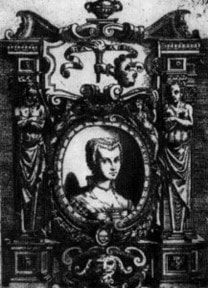|
I will first look at Franco’s poem, Capitolo 24. Franco wrote this poem as a response to a man who had insulted and threatened another woman, presumably a fellow courtesan. The entire poem is 160 lines. I will examine lines 70-90 as seen below:
Earlier in the poem, Franco argues that virtue lies in the soul and mind and that women “have given/ more than one sign of being greater than men” in this way (65-66). In the excerpt above, Franco outlines the ways in which women show their superiority in virtue. Franco seems to make two arguments here: first, that submission to men serves as an act of virtue and second, that childbearing plays a significant role in both submission and in improving the condition of the world. Through their submission and childbearing, Franco argues, women are superior to men in virtue.
Franco describes the submission of women as an adaptive response to the weakness of men. Women must guide and carry men because men are weak and prone to “fall” without women’s support. Franco implies that because men “do wrong,” they cannot support the weak in the same way women support men. As a result, women must become the submissive party if they want to “avoid pursuing wrongdoing.” Submission is thus a choice women make in order to compensate for the shortcomings of men. Still, Franco reminds the man whom the poem addresses that, if women were to ignore this call to service and reveal their superiority, women would easily “surpass” men. Yet, a woman intentionally “submits to tyrannical, wicked man” and becomes “silent.” The submission of women, for Franco, acts as both a virtue and a reflection of the strength women have in comparison to men. Childbearing, for Franco, exemplifies the virtuous and indispensable submission of women. An end to the submission of women, according to Franco, directly results in an end to childbearing. Franco presents childbearing as a paradigm act of submission. Yet, in providing offspring, women have the unique ability to play a role in improving the condition of the world. For Franco, women bear children so that women do not “ruin the world” and instead, make the world “beautiful.” In this way, submission can be said to empower women as they are able to affect the world in a significant and unique manner by giving birth. For Franco, childbearing embodies the powerful sacrifice women make in order to improve the condition of the world. This submission is also voluntary and actively chosen as a result of the superior reason and morality of women. In the excerpt above, Franco tells the story of why men became the dominate sex. According to Franco, the power of men results directly from the grace and selflessness of women who are wiser and superior in virtue. In order to compensate for the failures of the weaker sex, women submit and support men. The power given to men, however, can be taken back at any time if women refuse to procreate. Yet, their virtuous and reasonable nature leads them to do what is best for the world as a whole and bring the beauty of offspring into the world. The submission of women to men, seen especially in childbearing, exemplifies the virtue and reason of women as they refrain from revealing their true superiority to better serve the world.
0 Comments
Leave a Reply. |
Authors
Jacinta Shrimpton is a PhD student in Philosophy at the University of Sydney. She is co-producer of the ENN New Voices podcast Archives
May 2024
Categories
All
|

 RSS Feed
RSS Feed